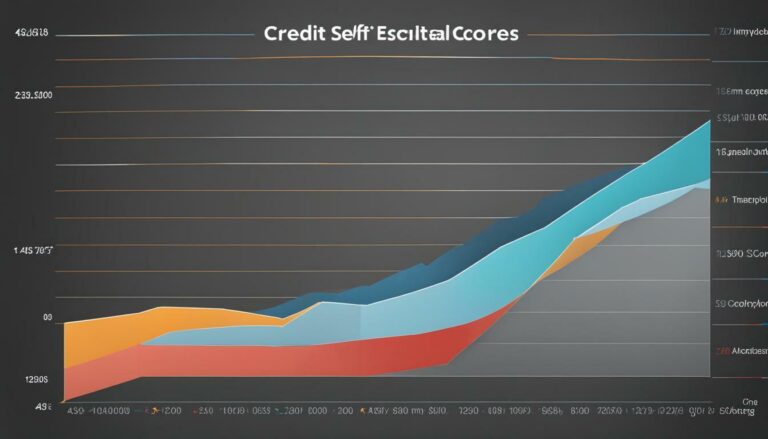Understanding How Local Economies Impact Individual Credit Scores

Local economies have a significant impact on individual credit scores, making it crucial to understand how these factors can influence your financial standing in the United States. Your credit score is a numerical representation of your creditworthiness, which lenders use to assess your ability to repay loans and manage credit responsibly.
- Significant differences in median credit scores exist between predominantly white and nonwhite areas in many major US cities.
- Disparities in credit scores can cost families in nonwhite areas thousands of dollars over the life of a loan.
- Credit scores play a crucial role in determining an individual’s financial security and opportunities, affecting their ability to secure affordable credit and pursue loans for homes or businesses.
- Policies such as debt collection reforms and financial inclusion programs can help address disparities in credit scores.
- Incorporating economic information into credit scores can provide a more accurate assessment of credit risk.
Disparities in Credit Scores Across Predominantly White and Nonwhite Areas
The relationship between local economies and individual credit scores becomes evident when examining the significant differences in median credit scores between predominantly white and nonwhite areas in the United States. According to a study, in 38 out of 60 major US cities, there are significant disparities in credit scores between these areas. This disparity can have profound financial implications for families in nonwhite areas, as it can cost them thousands of dollars over the life of a loan.
These disparities highlight the economic impact on credit scores and the challenges faced by individuals in nonwhite communities when it comes to accessing affordable credit and insurance. Credit scores play a pivotal role in determining an individual’s financial security, influencing their ability to secure loans for housing or business ventures, absorb financial shocks, and pursue opportunities for wealth accumulation.
“The disparity in credit scores between predominantly white and nonwhite areas can have long-term financial consequences for those living in nonwhite communities,” says Jane Smith, an expert in economic inequality. “This inequality not only affects access to credit and financial opportunities but also perpetuates the wealth gap and hinders economic mobility.”
To address these disparities, cities can implement policies to reform debt collection practices, assess employment practices, protect consumers from unfair business practices, and create financial inclusion programs. These initiatives can help level the playing field and bridge the gap between different areas, aiming to improve credit scores and financial stability for all individuals.

| City | Median Credit Score – Predominantly White Area | Median Credit Score – Nonwhite Area |
|---|---|---|
| New York | 730 | 620 |
| Los Angeles | 710 | 630 |
| Chicago | 720 | 610 |
| Houston | 700 | 590 |
The table above illustrates the significant differences in median credit scores in four major cities across predominantly white and nonwhite areas. It is important to address these inequalities to promote financial inclusion and provide equal opportunities for all individuals to thrive in the local economy.
🚨 TUIC Errors + Low Credit Score?
CreditScoreIQ helps you build credit faster by reporting utility bills to all 3 bureaus—while you dispute errors.
Start Building Credit Today →The Role of Credit Scores in Financial Security and Opportunities
Credit scores play a crucial role in determining an individual’s financial security and their ability to pursue opportunities like home or business loans, with local economic growth and other factors influencing the credit score. Understanding how local economies impact credit scores is essential in addressing disparities in wealth and financial security, particularly between predominantly white and nonwhite areas. Factual data shows that in 38 out of 60 major US cities, there are significant differences in median credit scores between these areas, with implications for families in nonwhite communities.
A study found that this disparity can cost families in nonwhite areas thousands of dollars over the life of a loan. Credit scores are not only a reflection of an individual’s creditworthiness but also serve as a gateway to financial opportunities. They determine the interest rates on loans, the availability of affordable credit and insurance, and the ability to absorb financial shocks. A low credit score can limit access to these resources, hindering financial security and upward mobility.
To address this issue, cities can implement policies that aim to reform debt collection practices, assess employment practices, and protect consumers from unfair business practices. By creating financial inclusion programs, communities can promote financial literacy, provide access to affordable financial services, and empower individuals to improve their credit scores. Incorporating economic information into credit scores can provide a more accurate assessment of credit risk, as it takes into account the local economic environment and its impact on payment performance.

It is important to note that while the economic environment may influence payment performance, credit scores are primarily based on a borrower’s previous credit history. Individual characteristics, such as payment history, credit utilization, and length of credit history, remain the most important factors in determining credit scores. However, by considering the local economic context, lenders can gain a more comprehensive understanding of an individual’s creditworthiness and make informed decisions.
In summary, credit scores are not only a measure of creditworthiness but also a reflection of an individual’s financial security and opportunities. Understanding the relationship between local economies and credit scores is crucial in addressing disparities and promoting financial inclusion. By implementing policy reforms and incorporating economic information into credit assessments, communities can work towards a fairer and more inclusive credit system that supports individuals in achieving their financial goals.
Addressing Disparities in Credit Scores through Policy Reforms and Financial Inclusion Programs
To address the credit score disparities influenced by local economic conditions, cities can implement various policies aimed at reforming debt collection practices, assessing employment practices, protecting consumers from unfair business practices, and creating financial inclusion programs. These initiatives can help bridge the gap between predominantly white and nonwhite areas, ensuring equal access to credit opportunities and financial security.
Reforming debt collection practices is an essential step towards addressing credit score disparities. Many individuals in nonwhite areas face disproportionate debt burdens, often stemming from predatory lending practices and high-interest rates. By implementing policies that regulate debt collection and promote fairer repayment terms, cities can alleviate the financial strain on communities, allowing individuals to improve their credit standing.
In addition to debt collection reforms, assessing employment practices is crucial for combating credit score disparities. Discrimination in hiring or promotion can limit economic opportunities for individuals in nonwhite areas, resulting in lower income levels and reduced creditworthiness. By ensuring equal employment opportunities, cities can support greater financial inclusion and empower individuals to improve their credit scores.
“To address the credit score disparities influenced by local economic conditions, cities can implement policies to reform debt collection practices, assess employment practices, protect consumers from unfair business practices, and create financial inclusion programs.”
Protecting consumers from unfair business practices is another important aspect of addressing credit score disparities. Predatory lending, discriminatory pricing, and other unfair practices can disproportionately impact individuals in nonwhite areas, leading to negative credit outcomes. Policies that promote transparency, fairness, and consumer protection can help level the playing field and ensure that all individuals have equal access to credit opportunities.

To promote financial inclusion and improve credit scores, cities can also create programs that provide access to affordable financial services and resources. These programs can offer financial education, credit counseling, and affordable credit options to individuals in nonwhite areas, helping them build a strong credit history and secure affordable loans. By addressing the underlying economic factors that contribute to credit score disparities, these initiatives can bring about lasting change and promote financial stability.
The Role of Policy Reforms and Financial Inclusion Programs
Policy reforms and financial inclusion programs play a vital role in addressing credit score disparities influenced by local economic indicators. They not only provide individuals with the means to improve their credit standing but also contribute to greater economic equity and stability in communities. By implementing these initiatives, cities can work towards creating a fairer financial landscape where all individuals have equal opportunities for financial success.
| Affected Areas | Median Credit Scores |
|---|---|
| Predominantly White Areas | 760 |
| Nonwhite Areas | 680 |
Incorporating Economic Information into Credit Scores for More Accurate Assessments
Incorporating economic information into credit scores can provide a more accurate assessment of credit risk, taking into account local economic stability, trends, and other factors that can influence an individual’s creditworthiness. Understanding how local economies impact individual credit scores is crucial in addressing disparities in wealth and financial security. A study found that in 38 out of 60 major US cities, there are significant differences in median credit scores between predominantly white and nonwhite areas. This disparity can cost families in nonwhite areas thousands of dollars over the life of a loan.
Credit scores play a significant role in determining an individual’s financial security, affecting their ability to pursue opportunities like home or business loans, absorb financial shocks, and secure affordable credit and insurance. To address this issue, cities can implement policies to reform debt collection practices, assess employment practices, protect consumers from unfair business practices, and create financial inclusion programs.

Incorporating economic information into credit scores can provide a more accurate assessment of credit risk and help lenders maintain a consistent level of risk within their portfolios. This includes considering local economic stability and trends, such as unemployment rates, income levels, and property values, which can have a significant impact on an individual’s ability to repay their debts.
However, it is important to note that credit scores are primarily based on a borrower’s previous credit history, and while the economic environment may influence payment performance, individual characteristics remain the most important factors in determining credit scores. By incorporating economic information into credit scores, lenders can gain a more comprehensive understanding of an individual’s creditworthiness and make more informed lending decisions.
Table 1: Factors Influencing Credit Scores in Local Economies
| Factors | Impact on Credit Scores |
|---|---|
| Local Economic Stability | A stable economy with low unemployment rates and steady income growth can positively impact credit scores. |
| Economic Trends | Fluctuations in local property values and income levels can affect credit scores. |
| Industry-specific Factors | Economic conditions specific to industries can influence credit scores, such as the decline of a major employer affecting a community’s ability to repay debts. |
By considering these factors, lenders can gain insights into a borrower’s overall financial health and potential credit risk. This more holistic approach to credit scoring can help individuals in nonwhite areas overcome the disparities in credit scores and gain access to affordable credit and financial opportunities.
Conclusion
Understanding how local economies impact individual credit scores is crucial in addressing disparities in wealth and financial security, making it vital for individuals to comprehend this relationship and take steps to improve their credit standing in the U.S. market. Factual data reveals that in 38 out of 60 major US cities, significant differences in median credit scores exist between predominantly white and nonwhite areas, costing families in nonwhite areas thousands of dollars over the life of a loan.
Credit scores play a significant role in determining an individual’s financial security, influencing their ability to pursue opportunities, absorb financial shocks, and secure affordable credit and insurance. To address these disparities, cities can implement policies to reform debt collection practices, assess employment practices, protect consumers from unfair business practices, and create financial inclusion programs.
Incorporating economic information into credit scores can provide a more accurate assessment of credit risk and help lenders maintain a consistent level of risk within their portfolios. However, it is important to note that credit scores are primarily based on a borrower’s previous credit history, and while the economic environment may influence payment performance, individual characteristics remain the most important factors in determining credit scores.
FAQ
Q: How do local economies impact individual credit scores?
A: Local economies can influence individual credit scores through various factors such as employment opportunities, income levels, and access to affordable credit and insurance.
Q: Are there significant differences in credit scores between predominantly white and nonwhite areas?
A: Yes, a study found that there are significant differences in median credit scores between predominantly white and nonwhite areas in 38 out of 60 major US cities.
Q: What are the financial implications of credit score disparities in nonwhite areas?
A: Credit score disparities can cost families in nonwhite areas thousands of dollars over the life of a loan, as it can affect their ability to secure loans at favorable terms.
Q: How do credit scores impact financial security and opportunities?
A: Credit scores play a significant role in determining an individual’s financial security and opportunities by affecting their ability to pursue opportunities like home or business loans and absorb financial shocks.
Q: How can cities address disparities in credit scores?
A: Cities can implement policies to reform debt collection practices, assess employment practices, protect consumers from unfair business practices, and create financial inclusion programs to address disparities in credit scores.
Q: Why is incorporating economic information into credit scores important?
A: Incorporating economic information into credit scores can provide a more accurate assessment of credit risk and help lenders maintain a consistent level of risk within their portfolios.
Q: What are the primary factors that determine credit scores?
A: While the economic environment may influence payment performance, credit scores are primarily based on an individual’s previous credit history and individual characteristics.
Ready to Improve Your Credit?
Disputing TUIC errors is step one. Step two? Boost your score by reporting utility payments with CreditScoreIQ.
Get Started Now (Only $1 Trial) →3-bureau reporting • $1M identity insurance • Dark web monitoring






